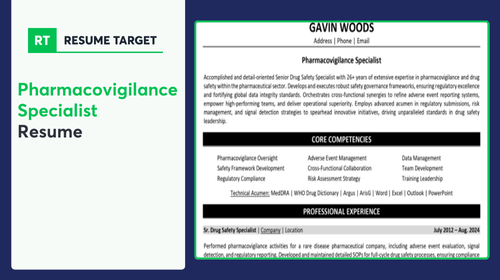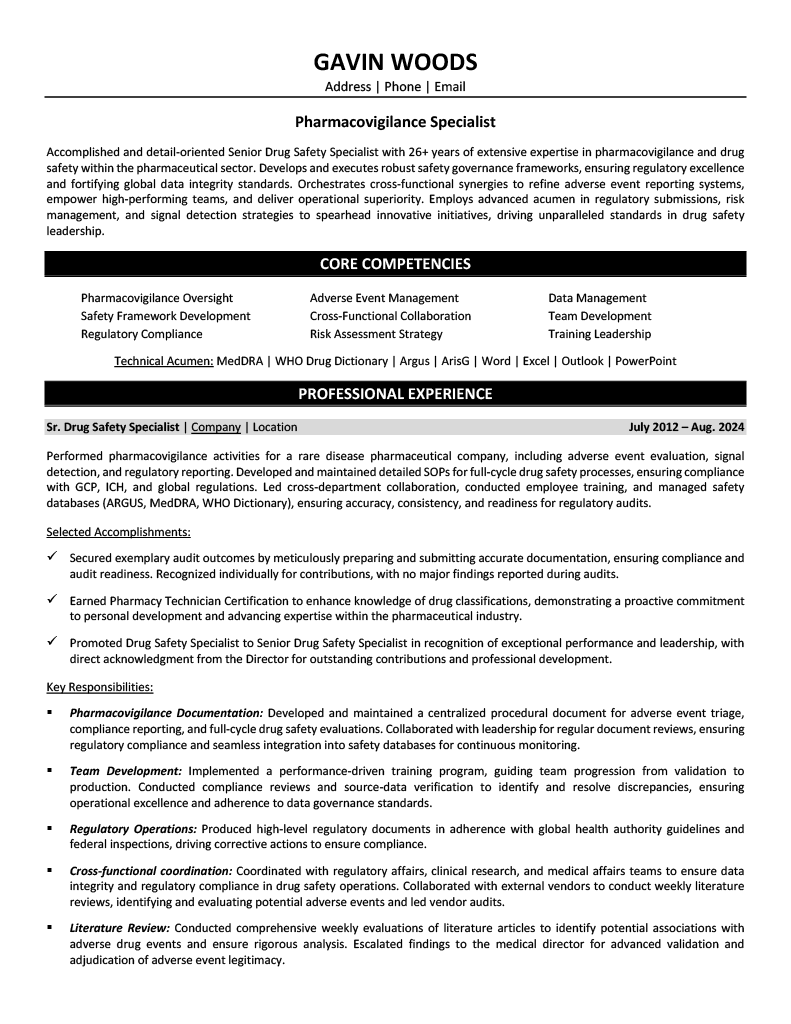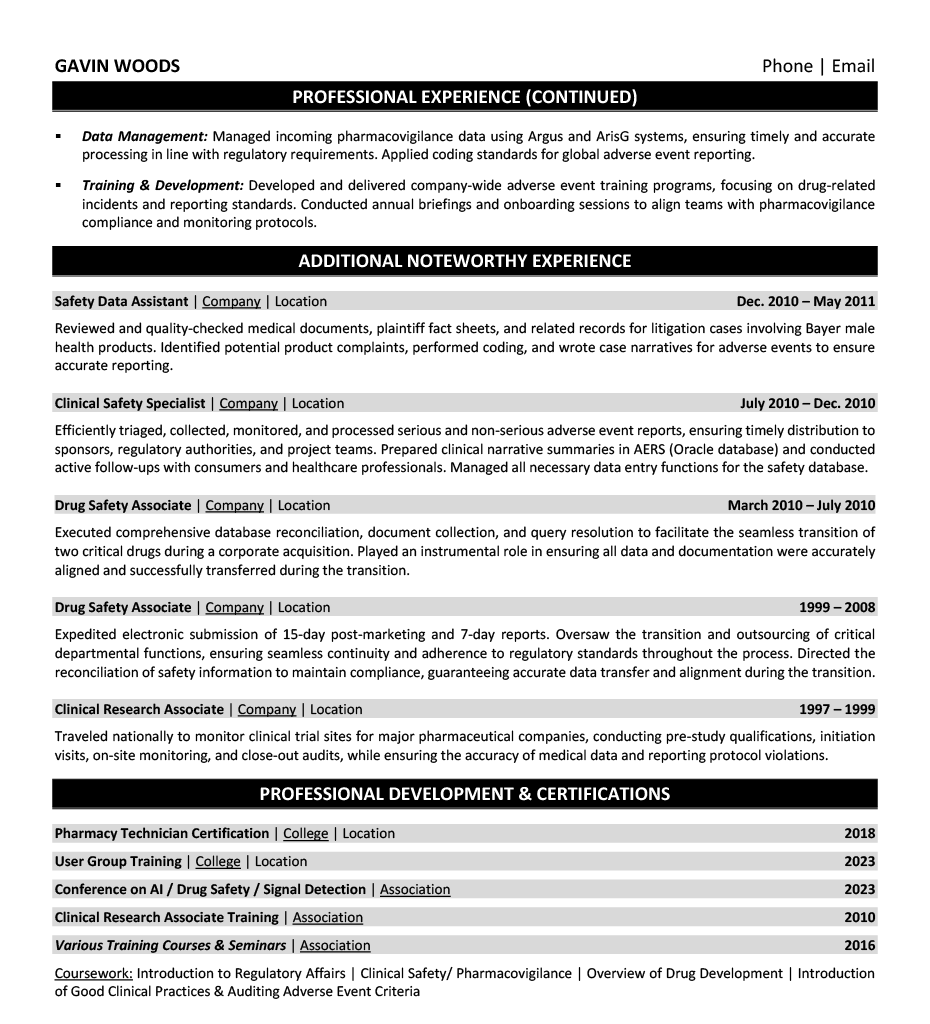

Tracking drug safety data is complex, but writing a resume that captures your expertise shouldn't be. Many Pharmacovigilance Specialists struggle to translate their technical work into compelling achievements that hiring managers understand.
Are you finding it challenging to showcase both your scientific knowledge and business impact? Your resume needs to bridge the gap between detailed adverse event monitoring and the broader value you bring to drug safety programs.
Resume Target helps Pharmacovigilance Specialists transform technical experience into powerful career stories. We'll show you how to highlight your expertise in adverse event reporting, risk management, and regulatory compliance while demonstrating your real-world impact on patient safety.


As the watchful guardians of medication safety, Pharmacovigilance Specialists are the ones who ensure that pharmaceutical products remain safe during clinical trials and after they reach the market, protecting millions of patients worldwide from potential adverse effects.
Your role involves meticulously analyzing safety data, investigating reported side effects, and connecting the dots between medication use and patient outcomes - think of yourself as a medical detective who uses scientific expertise to uncover potential safety signals that others might miss.
Whether you're just starting in the field or looking to advance your career, the path of a Pharmacovigilance Specialist offers diverse opportunities to grow from monitoring individual case reports to leading global safety initiatives and shaping pharmaceutical safety policies.
Let's talk about the exciting earning potential in the Pharmacovigilance field! Your career as a Pharmacovigilance Specialist opens doors to impressive compensation packages, with opportunities to significantly increase your earnings as you gain experience and expertise. And guess what? The highest-paying markets include thriving healthcare hubs in Oregon, Massachusetts, and California, where your skills are in particularly high demand.
Figures from: Talent.com
Pharmacovigilance offers two exciting career paths: management or technical specialization. Your journey can progress from monitoring drug safety to leading global safety initiatives and directing pharmaceutical safety programs.
To accelerate your career growth in pharmacovigilance, you'll need to master both technical expertise and leadership capabilities that go beyond basic drug safety monitoring.
- Advanced proficiency in Oracle Argus and ArisGlobal systems - Comprehensive knowledge of global regulatory requirements - Signal detection and risk management expertise - Strategic communication and stakeholder managementBreaking into pharmacovigilance starts with building a strong foundation in life sciences or healthcare, gaining relevant certifications, and developing expertise in drug safety monitoring and reporting systems.
To advance in this field, you'll need to develop strong technical expertise in pharmacovigilance databases and software systems like Oracle Argus, along with excellent analytical and communication skills.
Requirements from CCRPS
Struggling to showcase your drug safety expertise, adverse event monitoring experience, and regulatory compliance knowledge in a way that catches a hiring manager's eye? This comprehensive, section-by-section guide will help you create a pharmacovigilance specialist resume that effectively highlights your clinical expertise and safety assessment capabilities.
If you're like most Pharmacovigilance Specialists, condensing years of drug safety monitoring, adverse event analysis, and regulatory compliance work into a few powerful sentences can feel overwhelming.
While you excel at detecting safety signals and managing complex drug safety databases, translating these specialized skills into a compelling summary that catches a hiring manager's attention requires a different kind of precision - one that showcases both your technical expertise and your impact on patient safety.
How would you characterize your overall approach to drug safety monitoring and your ability to balance regulatory compliance with efficient adverse event processing?
Reason: This helps frame your professional identity and demonstrates your understanding of the dual nature of pharmacovigilance work - maintaining both compliance and operational efficiency.
What unique perspective do you bring to pharmacovigilance from your combined experience with safety databases, regulatory requirements, and cross-functional collaboration?
Reason: This question helps articulate your value proposition by highlighting the intersection of technical, regulatory, and interpersonal skills that make you effective in pharmacovigilance.
How would you describe your evolution as a pharmacovigilance professional in terms of handling increasingly complex safety data and adapting to changing global regulations?
Reason: This helps showcase your professional growth and adaptability, which are crucial elements in pharmacovigilance where regulations and methodologies constantly evolve.
As a Pharmacovigilance Specialist, you need to showcase both your technical expertise in adverse event monitoring and your ability to navigate complex regulatory requirements.
Your resume should highlight your proficiency with safety databases like Argus or ARISg, alongside essential skills like medical writing, risk assessment, and your understanding of global pharmacovigilance regulations including ICH guidelines and FDA requirements.
Showcase your drug safety expertise by organizing your experience into three powerful sections: a concise role overview highlighting your monitoring scope, measurable achievements in adverse event management, and core responsibilities demonstrating your regulatory compliance and safety surveillance capabilities.
Many Pharmacovigilance Specialists struggle to effectively demonstrate how their detailed safety monitoring work translates to meaningful business impact. Transform your technical drug safety expertise into compelling achievements by connecting your vigilance activities to measurable improvements in patient safety outcomes and regulatory compliance rates.
The responsibilities section demonstrates how Pharmacovigilance Specialists ensure drug safety and regulatory compliance beyond routine monitoring. Your role description should help non-technical recruiters understand how you contribute to patient safety and pharmaceutical company compliance with global regulations.
Your education and certifications in pharmacovigilance demonstrate your expertise in drug safety monitoring and adverse event reporting. Prioritize your most relevant qualifications, especially those focused on safety signal detection, regulatory compliance, and pharmacovigilance database management.
Now that you've created a strong foundation using Resume Target's comprehensive resume writing guidelines, you're ready to transform your CV into a powerful tool for landing your ideal pharmacovigilance role.
While many candidates stop at customizing their cover letter, successful pharmacovigilance specialists know that personalizing their resume for each position is crucial in today's competitive pharmaceutical industry.
A tailored resume not only helps you navigate through ATS systems by incorporating role-specific keywords, but it also demonstrates to hiring managers your precise alignment with their drug safety monitoring needs and regulatory compliance requirements.
Ready to stand out in the pharmacovigilance field? Let's transform your resume into a targeted document that showcases exactly why you're the perfect candidate for each position you pursue!
Don't let a lack of direct experience hold you back from pursuing a career in pharmacovigilance!
Your path to becoming a Pharmacovigilance Specialist can start by showcasing your relevant education, clinical knowledge, and any healthcare-related projects or internships that demonstrate your understanding of drug safety and adverse event monitoring.
Focus on highlighting your scientific background, attention to detail, and analytical capabilities in your resume.
For more guidance on structuring your entry-level healthcare resume, check out the Student Resume Writing Guide to ensure you're presenting your qualifications effectively.
Transform your pharmaceutical sciences education and clinical research experience into a compelling narrative that showcases your dedication to drug safety and patient well-being.
Your summary should emphasize your understanding of adverse event reporting, regulatory requirements, and any relevant internship or laboratory experience that demonstrates your readiness for a pharmacovigilance role.
"Detail-oriented and methodical Pharmacovigilance Specialist with foundational experience through academic research and clinical internships in adverse event monitoring and drug safety assessment. Proficient in pharmacology principles, GCP guidelines, and safety database management, with demonstrated ability to analyze and document adverse events during university research projects. Completed specialized training in pharmacovigilance processes and regulatory reporting requirements. Seeking to leverage strong analytical skills and patient safety focus to contribute to a pharmaceutical company's drug safety initiatives."
Now's your chance to showcase the specialized education and training that prepared you for the critical world of drug safety monitoring and adverse event reporting!
Transform your academic background into compelling content by highlighting relevant coursework like "Clinical Trial Safety"or "Adverse Event Analysis,"along with any research projects or case studies that demonstrate your ability to evaluate drug safety data.
The common courses for a Pharmacovigilance Specialist degree/certification include various modules, comprehensive courses, and self-paced online courses that encompass essential skills and knowledge in the field.Relevant Coursework: Clinical Safety & Pharmacovigilance | Adverse Event Reporting | Drug Safety Regulations | Medical Writing & Documentation | Clinical Trial Management | Regulatory Compliance & Standards
Key Projects:
Safety Signal Detection Analysis: Conducted comprehensive analysis of adverse event reports for a newly launched cardiovascular medication, resulting in the identification of previously unreported safety signals and development of risk minimization strategies.
Pharmacovigilance Database Management Project: Led a team of four students in designing and implementing a drug safety database system for tracking and managing adverse event reports.
Transform your academic knowledge, internship experiences, and technical training into a compelling skills section that showcases your ability to monitor drug safety, analyze adverse events, and maintain compliance with regulatory requirements.
As an entry-level Pharmacovigilance Specialist, your combination of scientific knowledge and attention to detail positions you well for a career in drug safety monitoring, with excellent growth potential in the expanding pharmaceutical industry.
Let's face it - translating complex drug safety protocols and adverse event monitoring into compelling resume achievements can feel like trying to fit a clinical study report onto a sticky note.
At Resume Target, we specialize in crafting resumes for pharmacovigilance professionals that clearly showcase your impact in patient safety and regulatory compliance.
Our expert writers understand how to position your experience with safety databases, signal detection, and regulatory reporting in a way that resonates with both automated tracking systems and human recruiters.
With major pharma companies expanding their safety divisions and increasing demand for PV specialists, now is the perfect time to upgrade your resume - let's connect today to help you stand out in this competitive field.
Impress any hiring manager with our Pharma resume writing service. We work with all career levels and types of Pharma professionals.
Learn More → Pharma Resume Writing Services